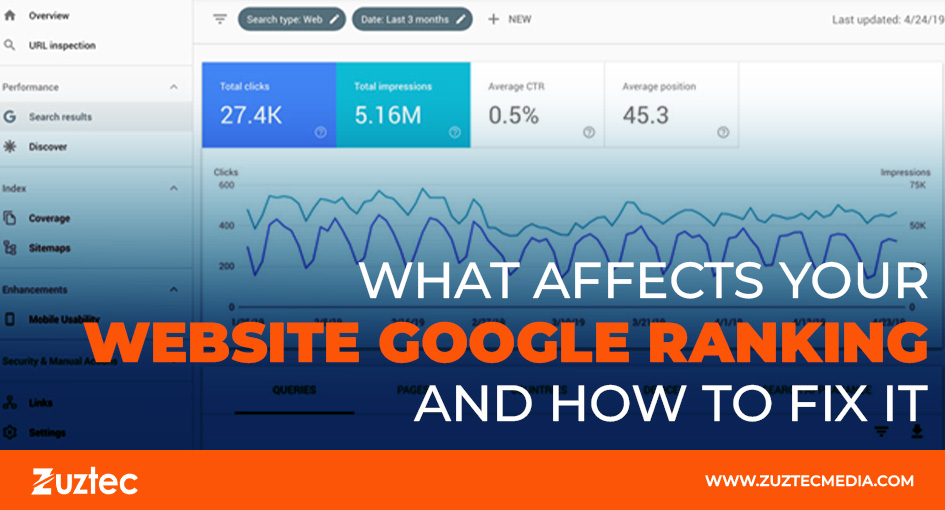
What Affects Your Website Google Ranking and How to Fix It
Achieving a high website Google ranking is a critical goal for anyone with an online presence. Whether you’re running a personal blog, an eCommerce site, or a corporate business page, ranking well on Google is essential to drive traffic, increase visibility, and ultimately generate more leads or sales. The higher your website ranks on search engine results pages (SERPs), the more likely users are to find and engage with your content, which directly impacts your business’s success. But reaching Google’s coveted first page is no small accomplishment. Google uses a complex algorithm that considers hundreds of ranking factors when determining where a website should appear in search results. These include off-page variables like backlinks and social signals as well as on-page components like technical SEO, keywords, and content quality. As search engine optimization (SEO) continues to evolve, it becomes increasingly important to understand what influences Google’s ranking decisions.
This article will take a closer look at what affects your website Google ranking and how to fix it. Whether you’re struggling to improve your website’s visibility or simply aiming to stay ahead of the competition, understanding these ranking factors is crucial. With the right strategies in place, you can boost your website’s performance and improve your chances of securing a higher position on Google’s search results. Whether you’re a beginner or an experienced website owner, these insights will help guide your SEO strategy and lead to long-term success.
Factors That Affect Your Website Google Ranking
- Content Quality and Relevance
Based on users’ search queries, the search engine seeks to deliver the most useful and pertinent content. If your website’s content is not well-written, informative, or relevant to user searches, it will negatively affect your website Google ranking, making it unlikely to rank well.
How to Fix It:
Make sure your material is valuable to your audience, relevant, and of good quality by conducting regular audits. Focus on creating long-form, well-researched articles that answer users’ questions. Incorporating keywords naturally throughout your content and ensuring it aligns with user intent can significantly improve your chances of ranking higher on Google.
- On-Page SEO Optimization
Off-page SEO is the process of optimizing certain pages of your website to improve their rankings. Headings, internal linking, title tags, meta descriptions, and URL structure are some examples of these elements. If these elements are not appropriately optimized, it can negatively impact your website Google ranking, reducing your chances of ranking highly on Google.
How to Fix It:
Make sure your meta descriptions and title tags are captivating, keyword-rich, and succinct. To arrange content in a structured way that is easier for visitors and search engines to browse, utilize header tags such as H1 and H2. Keep your URLs brief, informative, and keyword-focused to further optimize them.
- Backlinks
Backlinks links from other websites to yours are one of the most influential ranking factors in Google’s algorithm. Quality backlinks signal to Google that your website is credible and authoritative in your niche. However, not all backlinks are created equal. Links from trustworthy websites are given more weight than those from unreliable ones.
How to Fix It:
Focus on building high-quality backlinks from authoritative, relevant websites in your industry. You can achieve this by guest blogging, creating shareable content, and reaching out to influencers or industry leaders for collaborations. Steer clear of black-hat tactics, such as purchasing connections, as these may result in fines.
- Mobile-Friendliness
As more people use mobile devices to access the internet, Google has shifted to mobile-first indexing. This indicates that Google now primarily considers a website’s mobile version when determining rankings. If your website is not mobile-friendly, its rankings could suffer significantly.
How to Fix It:
Make sure your website adapts and functions properly across a variety of screen sizes by using responsive web design. Test your site using Google’s Mobile-Friendly Test to identify areas for improvement, and make sure that all your pages load properly on mobile devices.
- Page Load Speed
Both Google and users place a high value on a website’s speed. Websites that load slowly have high bounce rates, which might hurt your Google rating. Fast-loading websites are given preference by Google’s algorithm since they offer a better user experience.
How to Fix It:
To find areas for improvement in the load performance of your website, use tools such as Google PageSpeed Insights. To speed up your website, reduce the size of huge images, minify CSS and JavaScript, and activate browser caching. In addition to improving rankings, a faster website boosts consumer satisfaction.
- User Experience (UX) and Engagement Metrics
Google closely monitors user behavior on your website. High engagement metrics like long session durations, low bounce rates, and frequent page visits are signs of a good user experience. Websites with poor user experience tend to rank lower on Google, negatively affecting your website Google ranking and making it harder to appear at the top of search results.
How to Fix It:
Improve your website’s user interface (UI) design to ensure that visitors can easily find what they’re looking for. Reduce pop-ups, streamline navigation, and ensure that call-to-action buttons are prominently displayed. To keep an eye on engagement metrics and respond to user behavior, utilize Google Analytics.
In conclusion, improving your website Google ranking is an ongoing process that requires attention to various factors, from content quality to technical SEO and user experience. By focusing on these key elements such as improving your content, building quality backlinks, optimizing your site for mobile, and boosting page speed you can steadily improve your rankings and drive more traffic to your website. Keep in mind that SEO is a long-term strategy rather than a one-time endeavor. By staying committed to optimizing your site and staying updated with Google’s evolving algorithm, you can ensure that your website ranks high and stays competitive in search results.

